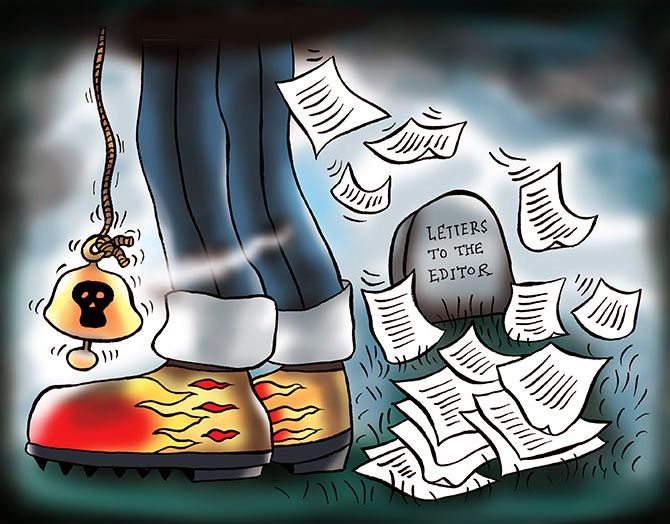'It may not be coincidental that the rise of these warriors with their bile and diatribes has come at a time when the concept of neutrality in journalism is fading,' says Amulya Ganguli.
Illustration: Uttam Ghosh

Two major newspapers -- The Times of India and Hindustan Times -- have done away with the Letters to the Editor column.
Why the decision was taken in the secluded board rooms of the two giant establishments will never be known. Perhaps it was felt that the contents of the letters were deteriorating.
Or that they had become anachronistic in the age of Twitter, Facebook, et al where opinions are being freely voiced on the Internet.
Even then, there is likely to be a tinge of regret among old-timers at the disappearance of a feature which, at one time, played a significant role in public life and even in moulding public opinion.
Its importance can be gauged from the near-iconic status of the column in The Times, London, which devoted considerable space to the views of people who are not formally associated with the media.
In India, The Statesman also gave a great deal of importance to the Letters column, presumably because of its links with the London newspaper.
Nor was their prominence wasted. One can recall an epistolary spat between two stalwarts of the cinema world, Satyajit Ray and Mrinal Sen, in the The Statesman's Letters column with the former dubbing one of Sen's film as a 'crow film.'
In Ray's Nayak, the hero, played by Uttam Kumar, meets an elderly person whose main claim to fame was that he regularly wrote letters to The Statesman.
It is also worth recalling that some of the letters in those days were quite educative. This cannot generally be said of today's missives in cyberspace which tend to be one-sided and abusive.
Perhaps the limits on the number of words force the writers to make their comments short and sharp although that does not explain the invectives.
The suspicion remains, therefore, that bias has replaced a balanced assessment because prejudice sells more than a reasoned argument.
If the letters of earlier times were rarely vicious, the reason was that, one, such intemperate tirades were simply not printed and, two, the contributors apparently took care about their efforts since getting one's name into print in a reputed newspaper or journal was a matter of pride.
Now, it has become all too easy on the Internet where comments can be dashed off without bothering about the language or the spelling or the argument. That not all newspapers have dispensed with the Letters is a sign that their value is still recognised.
But the space allotted to Vox Populi is shrinking. Only The Hindu among the major newspapers still has room for the amateur and occasional correspondent. So do magazines like India Today and Outlook.
There is little doubt that a perusal of these writings gives a fair idea of popular opinion unlike the trolls which are so much in vogue today.
It is not surprising that the dictionary meaning of troll is an ugly and evil person as well as a message whose purpose is to anger people. Both the descriptions will seem apt to the critics of these cyber warriors.
It may not be coincidental that the rise of these warriors with their bile and diatribes has come at a time when the concept of neutrality in journalism is fading.
Journalists have come to be associated with specific political views. Hence, the reluctance of even the voluble Narendra Modi to give interviews to all and sundry. Instead, he has a favourite among the presstitutes, the term proudly coined by the minister of state for external affairs, V K Singh.
The appearance of the so-called Internet Hindus is explained by the belief among them that most of the mainstream media is biased, mainly against the BJP, although Modi tends to get better press than the saffron fundamentalists.
In the bad old days, only the party organs -- whether of the Left or the Right -- were known as the vendors of certain political lines. Now, nearly the entire media is held guilty -- rightly or wrongly -- of the same offence.
Has this perception begun to influence the newspapers as well, leading to the dropping of the Letters column by some since they do not conform to a set view?
The same explanation probably holds true for the vanishing 'middles' or the edit page pieces which were written, like the Letters, by amateurs.
The Internet is apparently ringing the death-knell for these dabblers in print journalism who were usually retired persons with little else to do. Instead, the amateurs of today are the vitriolic young people who feature in cyberspace.
Amulya Ganguli is a writer on current affairs.
ALSO READ










